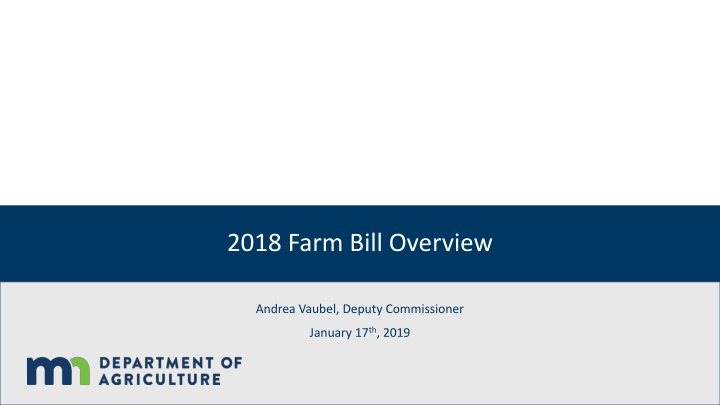
Key Highlights of the 2018 Farm Bill: Farm Safety Net, Hemp, Rural Mental Health
Explore the significant provisions of the 2018 Farm Bill, covering topics such as the farm safety net, hemp legalization, and rural mental health support. Understand the impact of the bill on crop insurance, hemp cultivation, and initiatives to address mental health challenges in farming communities.
Download Presentation

Please find below an Image/Link to download the presentation.
The content on the website is provided AS IS for your information and personal use only. It may not be sold, licensed, or shared on other websites without obtaining consent from the author. If you encounter any issues during the download, it is possible that the publisher has removed the file from their server.
You are allowed to download the files provided on this website for personal or commercial use, subject to the condition that they are used lawfully. All files are the property of their respective owners.
The content on the website is provided AS IS for your information and personal use only. It may not be sold, licensed, or shared on other websites without obtaining consent from the author.
E N D
Presentation Transcript
2018 Farm Bill Overview Andrea Vaubel, Deputy Commissioner January 17th, 2019
Farm Bill Overview The 2018 Farm Bill is a 529 page piece of legislation made up of 12 titles covering topics ranging from the farm safety net to nutrition to forestry The Farm Bill is up for reauthorization about every five years President Trump signed the 2018 Farm Bill into law on December 20, 2018 The bill is expected to cost about $867 billion over 10 years Nutrition programs make up about 80% Farm Bill funding
Important Farm Bill Provisions for Minnesota Farm Safety Net Dairy Hemp Rural Mental Health Animal Health Organic Agriculture
Farm Safety Net The Farm Bill protects crop insurance a major priority for farmers The bill reauthorizes and strengthens Agriculture Risk Coverage (ARC) and Price Loss Coverage (PLC) Farmers will be able to switch between ARC and PLC Farmers can update yields if they faced drought during the previous yield update Reference prices will be able to adjust to improved market conditions ARC will use Risk Management Agency data to minimize disparities between counties
Hemp The Farm Bill defines hemp as any part of the plant, including seeds, derivatives, extracts, and cannabinoids with a THC concentration below 0.3% Hemp is permanently removed from the Controlled Substances Act States must submit a plan to USDA and can impose internal restrictions - cannot interfere with interstate commerce Hemp will qualify for crop insurance and other federal grant programs
Rural Mental Health The Farm and Ranch Stress Assistance Network is reauthorized Expands eligible entities to include state departments of agriculture, cooperative extension, nonprofits, or other entities deemed eligible, OR any combination of 2 or more The program can be used to initiate, expand, or sustain programs with helplines, websites, support groups, outreach services, home delivery of assistance, and training for farmers and those who may assist farmers. Authorized for up to $10 million per year for the next five years
Animal Health The Farm Bill creates the National Animal Disease Preparedness and Response Program. The program will focus on: Analysis and surveillance Outreach and education Biosecurity Training Technology The Farm Bill creates a National Animal Vaccine Bank The bank will maintain sufficient quantities of vaccine to allow for rapid response Foot and Mouth Disease vaccine will be the initial priority
Organic Agriculture The Farm Bill increases funding for the National Organic Program and the Organic Agriculture Research and Extension Initiative Crop insurance agents will be required to include organic farming practices in their continuing education The bill provides resources for combatting fraudulent imports of organic products to the United States There will be a working group established with members from the USDA and the Department of Homeland Security to: o Identify imports of organically produced agricultural products o Verify authenticity of the products o Verify that products meet the requirements of organic products o Collect data on imports o Request feedback from stakeholders
Thank you! Andrea Vaubel Andrea.Vaubel@state.mn.us 651-201-6180
